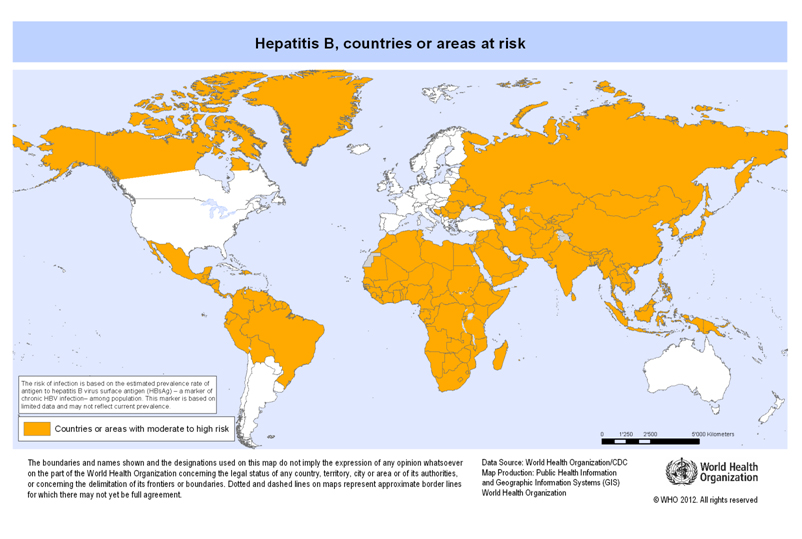Hepatitis B
 Disease
Disease
Hepatitis B is caused by the hepatitis B virus (HBV) and is a worldwide public health problem. Approximately 350 million people are believed to be chronic carriers of HBV
 Transmission
Transmission
Hepatitis B is highly infectious and virus can survive outside the body for 7 days and still remain infectious. It is an important occupational health hazard for unvaccinated healthcare workers.
- From person to person through direct blood contact In areas with high HBV endemicity (≥8%), transmission is usually vertical at time of birth from a chronically infected mother or horizontally in early childhood from infected to non infected child e.g. through bites, skin lesions and unsanitary habits.
- Through unprotected sexual intercourse.
- From contaminated blood or blood products.
- From use of contaminated equipment e.g. in medical or dental procedures, acupuncture, body piercing, tattoos or through injecting drug use.
 Vaccine schedule
Vaccine schedule
Hepatitis B Adults
| Age | Primary Schedule | Booster |
|---|---|---|
| 16 years + | 3 –4 doses at Day 0,7, 21 + 1 year * | 5 years (after primary schedule) |
* Full protection not given until final dose at 1 year. Will give adequate protection if leaving sooner.
Hepatitis B Paediatric
| Age | Primary Schedule | Booster |
|---|---|---|
| 12 months – 16 years | 3 doses at 0,1 and 6 months** | 5 years (after primary schedule) |
** accelerated schedule can be given at 0,1,2 and 12 months (Full protection not given until final dose at 1 year. Will give adequate protection if leaving sooner)
Hepatitis A + Hepatitis B Combined
| Age | Primary Schedule | Booster |
|---|---|---|
| 16 years + | 3 –4 doses at Day 0,7, 21 + 1 year * | Hepatitis A -25 years Hepatitis B – 5 years |
* Full protection not given until final dose at 1 year. Will give adequate protection if leaving sooner.
 Epidemiology + Risk Areas
Epidemiology + Risk Areas
Hepatitis B virus is found worldwide but there are geographical regions where risk of transmission is higher.
 MAP OF RISK AREAS Hep B
MAP OF RISK AREAS Hep B

 Clinical Aspects
Clinical Aspects
- Incubation - ranges from 40 to 160 days with an average of 60-60 days.
- Acute Illness - a potentially life threatening liver infection caused by the hepatitis B virus may occur, which may lead to resolution of infection or chronic carriage.
- Chronic Infection - may follow acute infection and is often asymptomatic but can progress to cirrhosis and sometimes hepatocellular carcinoma.
 Signs and symptoms
Signs and symptoms
- Infection can be asymptomatic however there may be a gradual onset of symptoms including:
- anorexia,
- abdominal discomfort,
- nausea, vomiting,
- arthralgia and rash, followed by jaundice.
Bristol
Bristol
BS6 6LD